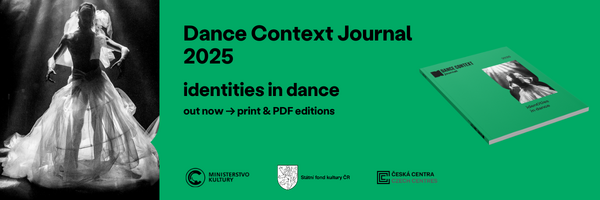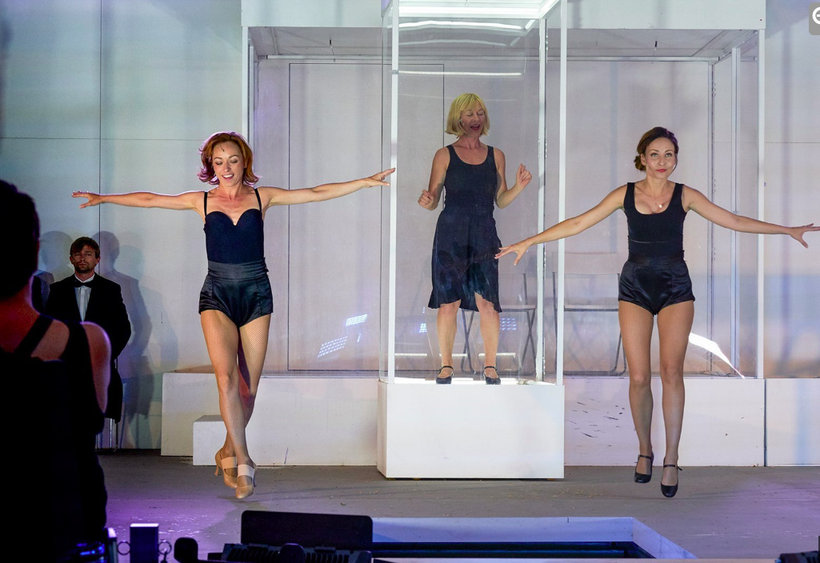MEDA THE DANCER
On the occasion of the 100th birthday of its founder, Meda Mládková, the Kampa Museum prepared an extensive programme entitled Century of Meda Mládková, celebrating her incredible anniversary. Among all the related events, one project surprisingly stands out – the theatre play Meda, inspired by the exceptional lady’s life story. The wife of the economist Jan Mládek (author of the statement: “If a nation’s culture survives, then so too does the nation”) is well known for being an art connoisseur, collector and benefactor, but less for her activities as an exile literature publisher, political discussions translator, and a dancer.
The play highlights the fact that Meda Mládková was also a professional dance artist, though in a book overviewing Czech dance of the 20th century (if any such publication existed) we would search for her name in vain. But why not to mention it here, if this important figure is one of the central themes of the outstanding production sold out long before its premiere?
In her youth, Meda Mládková was a revue dancer in Marta Aubrechtová’s dance group. While earning money by performing in dance shows, she was also living her teenage dream. And like this dream of hers, she was able to make her other visions and goals come true. It is not by chance the play’s main motto reads: “If you want, you can!”
Meda includes even more dance related features. Directed by the dancer and choreographer Adéla Laštovková Stodolová, the show stars Tatiana Dyková, an actress with similar dance background as her onstage character.
There are many dance scenes in the piece which are vital for the story. Clearly, the script and direction did not avoid accentuating the importance of dance in Meda Mládková’s life, on the contrary. Meda dances for money, to save her life, to win her love, to express her feelings, and embody the genius locus of Kupka’s paintings. Although Adéla Laštovková Stodolová did not opt for intricate and complicated dance numbers (contrary to what one might expect from a Duncan Centre and the Department of Nonverbal Theatre graduate), her bold mixture of diverse dance styles made for a fresh and explicit choreography. Some imperfections could be spotted in the tap dance routine (created by the alternating actress Kateřina Steinerová) in which the period style and rhythm went slightly wrong (maybe that is why the dancers wore dance shoes without metal taps). However, the number seemed to fit into the concept of the play. By contrast, the dance of ‘mice’ in papier-mâché masks was an interesting portrayal of the bureaucratic establishment in the pre-revolution Czechoslovakia. The scenography used a refined system of glass showcases of various sizes and shapes. Once again, the director Adéla Laštovková Stodolová proved her creative theatre potential. She combined it with Tatiana Dyková’s brilliant acting. Her performance dominated the stage, as Dyková incorporated dance into her way of embodying different ages of her character.
It is necessary to point out that Tatiana Dyková gives an astonishingly good dance performance. Her moves are elegant, precise, her arms fluid and seemingly endless. She avoids theatre pathos which so many star actors seem to display when dancing on stage. Dyková fuses her vocal expression with natural dance movement, without drawing much attention to her physical limits.
Meda is hosted by the Kampa Museum summer stage, which has been adjusted especially for this occasion and exclusively for this season. The dernière will take place on 8 September 2019, the day of Meda Mládková’s 100th birthday. We would like to join the crowd of well-wishers, since Meda Mládková has brought new inspiration into the Czech dance scene. And it is not only the genius locus of Kupka’s paintings that has motivated numerous Czech dance makers.
Written from the reprise held on 22 July 2019, on the Kampa Museum summer stage.
Meda
Direction and choreography: Adéla Stodolová Laštovková
Performers: Tatiana Dyková, Lukáš Příkazský, Dana Batulková / Stanislava Jachnická, Veronika Arichteva / Kateřina Steinerová, Jaromír Dulava / Daniel Rous, Daniel Šváb / Václav Krátký
Script: Daniela Šteruská
Dramaturgy: Magdalena Frydrychová
Stage design: Lucia Škandíková
Costumes: Tereza Kopecká
Music: Petr Zeman
Tap dance choreography: Kateřina Steinerová
Production: Tereza Nyklová
Producer: Daniela Šteruská, Mamon Art s.r.o.
Co-host: Museum Kampa
Première: 24 June 2019




